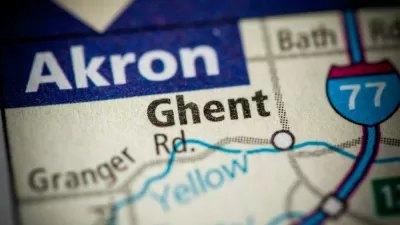As local officials claim that all is ready for work to begin on Cleveland's $330 million "Opportunity Corridor" road construction project, one writer critiques the plan's remaining shortcomings.
Writing for Rust Wire, Angie Schmitt pens a scathing critique of the Opportunity Corridor road construction project in Cleveland.
According to Schmitt, "everything’s speeding ahead and more or less final as far as the people with power over the situation are concerned as with the $331 million road project. I’m sort of disturbed about this because the $331 million road project still had a lot of pretty glaring issues it seems just aren’t going to get addressed."
Schmitt notes that the plan for the road has improved over the last year, including 19 fewer dead end streets created by the road, guaranteed construction contracts for minority and local contractors, a pedestrian bridge proximate to the East 55th rapid station, and reduced lane widths from 12 feet to 11.
Schmitt's argument, however, is that those improvements don't address the outstanding issues that make the project a questionable investment for the city. Schmitt details inadequate planning for bike infrastructure, transit riders, pedestrians, and the East 55th "jughandle."
To sum, Schmitt describes the project as a failure of planning: "This is a project that more than $30 million was spent 'planning.' And this is the end result? It’s disappointing, especially given how high-flying the rhetoric around this project has been. Those of us who have been making these kinds of points are more or less shouting into the wilderness, however, at this point. I’m not very optimistic that anything will improve and we will have blown an opportunity to create something that would be a real asset for urban neighborhoods."
FULL STORY: Evaluating the Actual Design of the Opportunity Corridor

Planetizen Federal Action Tracker
A weekly monitor of how Trump’s orders and actions are impacting planners and planning in America.

Congressman Proposes Bill to Rename DC Metro “Trump Train”
The Make Autorail Great Again Act would withhold federal funding to the system until the Washington Metropolitan Area Transit Authority (WMATA), rebrands as the Washington Metropolitan Authority for Greater Access (WMAGA).

DARTSpace Platform Streamlines Dallas TOD Application Process
The Dallas transit agency hopes a shorter permitting timeline will boost transit-oriented development around rail stations.

LA County Creating Action Plan to Tackle Extreme Heat
Los Angeles County is creating a Heat Action Plan to help communities stay safe during extreme heat, with steps like adding more shade, improving buildings, and supporting the neighborhoods most at risk.

Maryland Plans Quick-Build Complete Streets Projects
The state will use low-cost interventions to improve road safety in five Maryland counties.

Downtown Los Angeles Gears Up for Growth
A new report highlights Downtown L.A.’s ongoing revival through major housing projects, adaptive reuse, hospitality growth, and preparations for global events in the years ahead.
Urban Design for Planners 1: Software Tools
This six-course series explores essential urban design concepts using open source software and equips planners with the tools they need to participate fully in the urban design process.
Planning for Universal Design
Learn the tools for implementing Universal Design in planning regulations.
City of Charlotte
Municipality of Princeton
Roanoke Valley-Alleghany Regional Commission
City of Camden Redevelopment Agency
City of Astoria
Transportation Research & Education Center (TREC) at Portland State University
US High Speed Rail Association
City of Camden Redevelopment Agency
Municipality of Princeton (NJ)




























